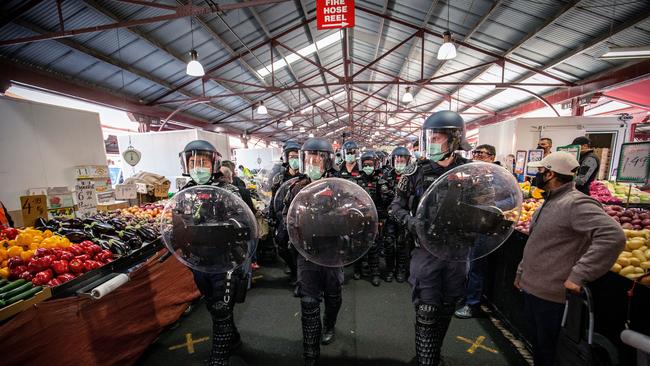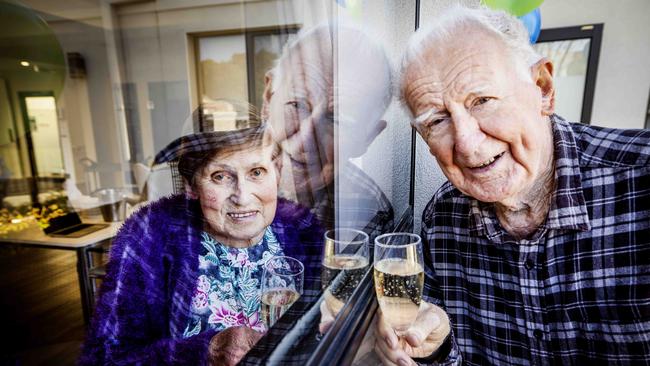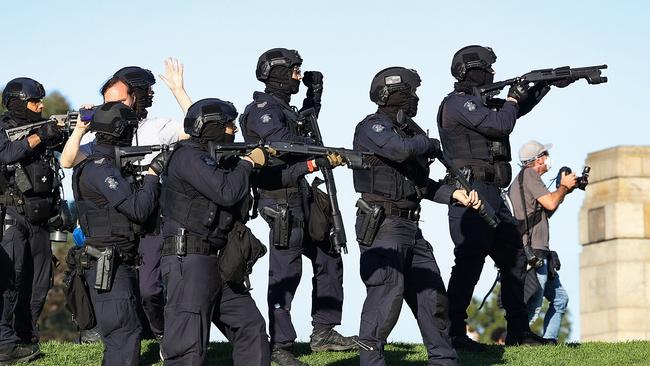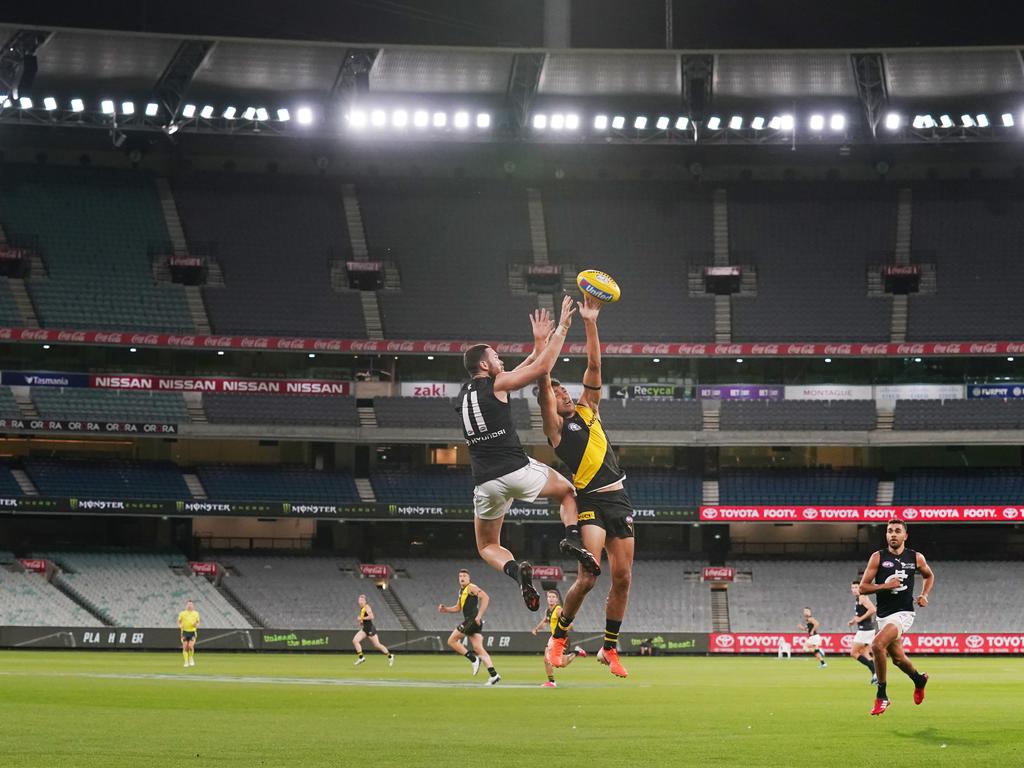Australia’s self-inflicted Covid damage is only in hindsight? What a sick joke that is
We allowed morons to run our country into the ground when they shouldn’t have been trusted with running a bath. This was an entirely man-made disaster — and we should never forget it.

Well those years flew by, didn’t they? I remember early in 2020 checking flights to Spain for my nephew’s July wedding, and hoping the news of an unpleasant flu virus coming out of China wouldn’t interfere with our plans.
Innocent soul that I was, I never imagined the event would be put off for two years; even less did I think we’d be unable to attend after that delay, still forbidden to leave our hermit kingdom.
It’s hard to determine what tops the league table of outrages Australians were subjected to during our embrace of the Covid pandemic. The international travel ban hurt me not so much because of missed holidays but because it stopped me seeing my terminally ill father in England before he died. I’d still like to hear how my departure from this country would have presented a threat to those who remained, just as so many others would like an explanation for why they were denied the right to see dying relatives by a bureaucracy with the compassion of Daleks (but I’ve answered my own question).
For me, the lack of humanity – graphically illustrated by socially distanced and attendance-capped funerals, the heartbreakingly lonely scenes in aged-care homes, the Queensland premier closing the state border even to medical emergencies and gloating that “we have Queensland hospitals for our people”, the demented curfews and house arrests – turned on its head everything I’d always believed about this country, its proud tradition of mateship abandoned by government fiat, evanescent as a soap bubble.
Others were disgusted by the obfuscation, perhaps absence, of any medical justification for the unprecedented – unlike the panic-mongers, I use the word in its true sense – suppression of our civil liberties. We were told ad bloody nauseam that the strategy was based on the finest advice, that our pants-wetting governments and their suddenly beatified health mandarins were following the science; but whose science, whose advice, was never made clear.
Were we inspired, perhaps, by the proportionate response of the Chinese Communist Party, which sensitively and scientifically welded its subjects into their Wuhan apartments and bludgeoned their pets to death in the streets below? Or by the warnings of serially discredited epidemiologist Neil Ferguson, who predicted, on the basis of his fantasy modelling, more than half a million Covid deaths in Britain?
We may never know because this high-level, utterly compelling advice, if it ever existed, has to this day not been released.

We certainly weren’t listening to Oxford University’s professor of evidence-based medicine, Carl Heneghan, who said in March 2020, before the lunacy began, “people with no co-morbidities can relax; you may feel funny but the mortality is incredibly low”; nor were we persuaded by Britain’s deputy chief medical officer Jenny Harries, who joined Heneghan in declaring “for most people it really is going to be a very mild disease”.
And so it was, for most people; but we underestimated our politicians’ egos. They would rather double down, dig in, go to any lengths to spare themselves the embarrassment of confessing their mistake or apologise for their catastrophically expensive overreaction.
Inevitable, then, that the political, medical and bureaucratic elites behind it would one day seek to rewrite history to reflect their noble success in guiding us wisely, gently and safely through a once-in-a-lifetime emergency.
What I didn’t foresee, though, was that they’d be so brazen as to do so before the bruises begin to fade. The latest thinking cheekily recommends we develop a plan for the next pandemic, ignoring that we already had one, updated and refined at great expense, that was abandoned the moment panic replaced sensible, calm leadership. Or did we?
Health Minister Mark Butler had a different opinion at the launch of the government’s once-over-lightly Covid inquiry in October 2024, saying “our pandemic plans were grossly inadequate for the scale of the challenge that Covid-19 presented to us”. Warming to his theme, Butler complained that our standing pandemic response “included no plan that would deal with the closure of the international border, which was such a central part of our response”, and there was “no plan to deal with quarantine, which was also incredibly important”.
Sorry, Minister, far from it.
The reason such measures were missing from the prepared plans was not an oversight; they had been widely dismissed as ineffective, even by so cautious a body as the World Health Organisation, which produced an 85-page report that gathered expertise from across the globe on ways to mitigate the impact of epidemic and pandemic influenzas.
Published in October 2019, just weeks before the first cases of Covid were identified in China, the document analysed previous pandemics and the effectiveness of proposed ways of dealing with them. It stated explicitly that of all the possible interventions, “contact tracing”, “quarantine of exposed individuals” and “border closures” were “not recommended in any circumstances”, concluding “the disadvantages outweigh the advantages”.
Not that any such prudence detained our leaders, whose nonsensical decrees about social distancing, exercise, going to the beach, park or golf course, 5km limits, carrying ID papers, QR codes, masks and so on were grudgingly followed. The compliance was hardly surprising, when our leaders were backed by a complicit mob of state-sponsored thugs – police officers, we used to call them – eager to strap on their armour and pepper-spray canisters, load the rubber-bullet guns and give any impertinent dissenters a good kicking.

Wasting my breath, of course, but the need for a royal commission into the entire fiasco, headed by someone of unimpeachable integrity, not beholden in any way to our governmental and bureaucratic overlords, is as urgent now as it was three years ago, when the grip on our throats began to relax.
The problem is that if we found such a person, nobody in authority looks brave enough to appoint them for fear their peers’ incompetence would be exposed. Besides, most of the main offenders have snuffled along the trough to secure positions closer to the swill bucket tipping out our taxpayer dollars.
Instead we’ll get more half-baked pseudo-inquiries that all open with the same exculpatory formulation that assumes the very thing many of us have questioned since the beginning: “The initial response to Covid saved thousands of lives”, they begin, then make a mealy-mouthed concession, “but looking back it appears there was some government overreach …” Or as Butler put it last year, “it is easy with the benefit of hindsight to second-guess decisions … made in the heat of the fight against a once-in-a-century pandemic”.
The Australian Human Rights Commission was at it this week with the release of its Collateral Damage report. “While Australia’s government responses during the Covid-19 pandemic helped save lives,” it said in a section labelled Lessons Learnt, “human rights impacts were not always considered or protected.”
This was followed by a selection of moving stories of people’s distress. It’s gratifying to learn the AHRC has pivoted away from hounding cartoonists to try to live up to its name, but it comes a few years too late to rejoice. It’s not for me to tell them how to do their job, but I fancy the ideal time to be bold in defence of our human rights might have been when they were under attack.
Can we once and for all bury this notion that the madness revealed itself only in the rear-view mirror of hindsight? It’s an insulting myth that suggests we were all initially supportive of the snap restrictions, only rebelling once our leaders had made us feel safe enough to do so. It was in fact obvious within days that Covid was a serious danger to the elderly and infirm but not to the young and fit.
So isolate the sick, protect and care for them, and leave the healthy to keep the country ticking over as normally as possible. How difficult an ambition would that have been? Instead we failed everyone, especially those who died early because their cancers grew undetected or who will live in pain because of surgery and treatments delayed.
There were many people who from the start viewed the approaching threat to long-cherished freedoms as more sinister than the virus and were prepared to say so immediately.
As one of them, I was fortunate to be employed by a publication that presents a broad range of opinions, including ones deemed “unhelpful” by the government of the day, so had the privilege of voicing my concerns more widely than most; but in comments on my first column on the topic, published on April 4, 2020, hundreds of readers also expressed their own misgivings with furious eloquence.
Many noted that the resources of the nation were focused on terrifying the population into submission, a suspicion confirmed later that month by Queensland’s chief health officer (now, after one of history’s most ludicrous promotions, the state’s Governor), who revealed the scare tactics, simultaneously monstrous and infantilising: “If you go out to the community and say, ‘This is so bad, we can’t even have schools, all schools have got to be closed’, you are really getting to people,” she said. “So sometimes it’s more than just the science and the health, it’s about the messaging.”
It should come as no surprise, particularly to a doctor, that impressionable children absorbed that messaging so completely. The adults supposed to reassure them had abandoned that role, instead screaming all the horrors their fevered imaginations conjured up.
Is it any wonder we are now seeing the deleterious impact on young people’s mental health, socialisation and education after three years of poisoning their developing minds with cynically manufactured anxiety?
Nor should we ignore the shameful contribution of some fawning media that sat at the feet of the dictators and amplified that anxiety. Not only are journalists as susceptible as anyone else to manipulation but many of us have a default setting that revels in chaos and disaster, in this case irresponsibly regurgitating the doom-laden pronouncements of some of the world’s least telegenic personalities while basking in their attention.
I shudder at the memory of the patronising “I make no apologies” premiers as they daily took to the stage to recite meaningless numbers of infection cases and thank us for our fine-induced obedience, vile exemplars of the dictum that politics is show business for ugly people. “Conviction” politicians all, convinced – against the evidence – of their own wisdom, brilliance and moral superiority. We allowed them to run our country into the ground when the morons shouldn’t have been trusted with running a bath.
Finally, consider the lost jobs, the small businesses destroyed, the untested generosity of JobKeeper payments, the productivity drain of work-from-home rorts, the billions squandered on negative testing and myriad other expenses and you’re getting no change from half a trillion dollars, a debt we’ll be servicing for decades.
It’s no surprise the predicted economic crisis now looks to be on its way, perhaps heralding a recession we didn’t need to have; it should be an interesting challenge for whichever party of disappointment crawls into government.
This week the world’s newspapers, TV channels and websites have been flooded with thoughtful articles on the lessons of Covid five years on, as though it was some external catastrophe, when the painful truth is that it was a disaster entirely of our own making.
The whole dismal experience certainly has plenty to teach us; what a pity the people who learn those lessons won’t be the ones who need to.






To join the conversation, please log in. Don't have an account? Register
Join the conversation, you are commenting as Logout